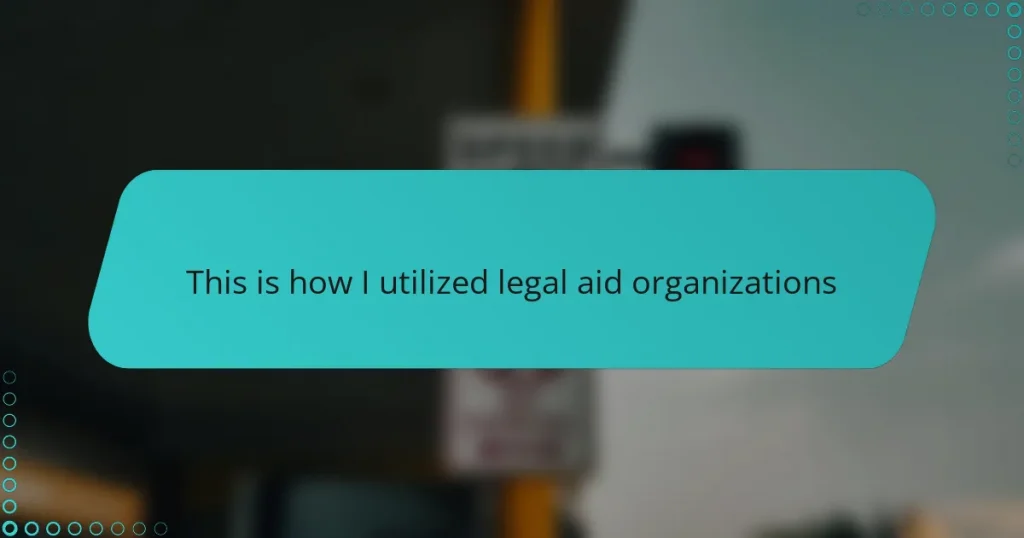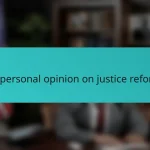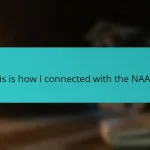Key takeaways
- Legal advocacy serves as a bridge to the justice system, empowering individuals by translating complex legal jargon into understandable terms.
- Accessing legal aid requires knowing where to look, including community centers and online resources, which provide essential guidance and support.
- Establishing a good match with a legal aid organization based on expertise and accessibility is crucial for effective assistance.
- Clear communication, patience, and transparency significantly enhance the effectiveness of legal aid services, empowering individuals to navigate their legal challenges confidently.
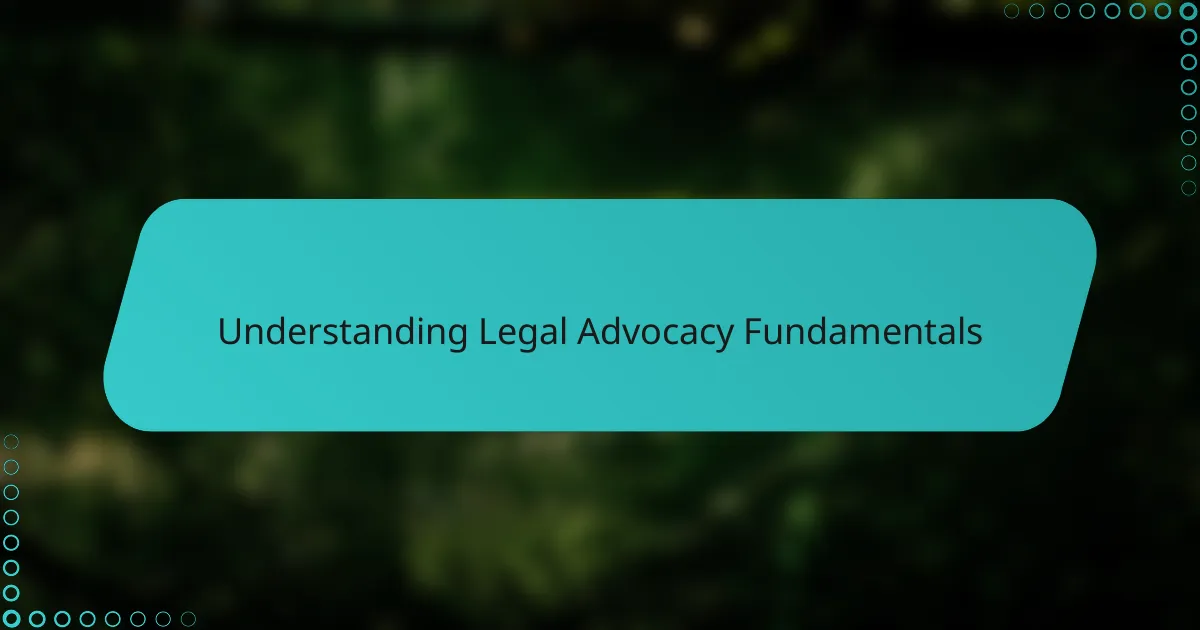
Understanding Legal Advocacy Fundamentals
Legal advocacy, to me, is more than just speaking up for someone in court. It’s about understanding the law deeply enough to guide others through it, often when they feel overwhelmed or powerless. Have you ever faced a situation where knowing the right word or law could have changed everything? That’s the essence of why legal advocacy matters.
When I first encountered legal aid organizations, I realized that advocacy is really about being a bridge—connecting people to the justice system, translating complex terms into everyday language. It’s a skill that requires patience and empathy because behind every case is a person who needs both support and empowerment. Reflecting on those moments, I see how advocacy transformed my role from just helping to truly making a difference.
What struck me most was the fundamental principle that legal advocacy is rooted in fairness. It challenges the idea that justice is reserved for those who can afford it. Instead, it insists that everyone deserves a voice and a chance. Don’t you think that’s a powerful belief to hold? That belief shaped how I approached every conversation and every case afterward.
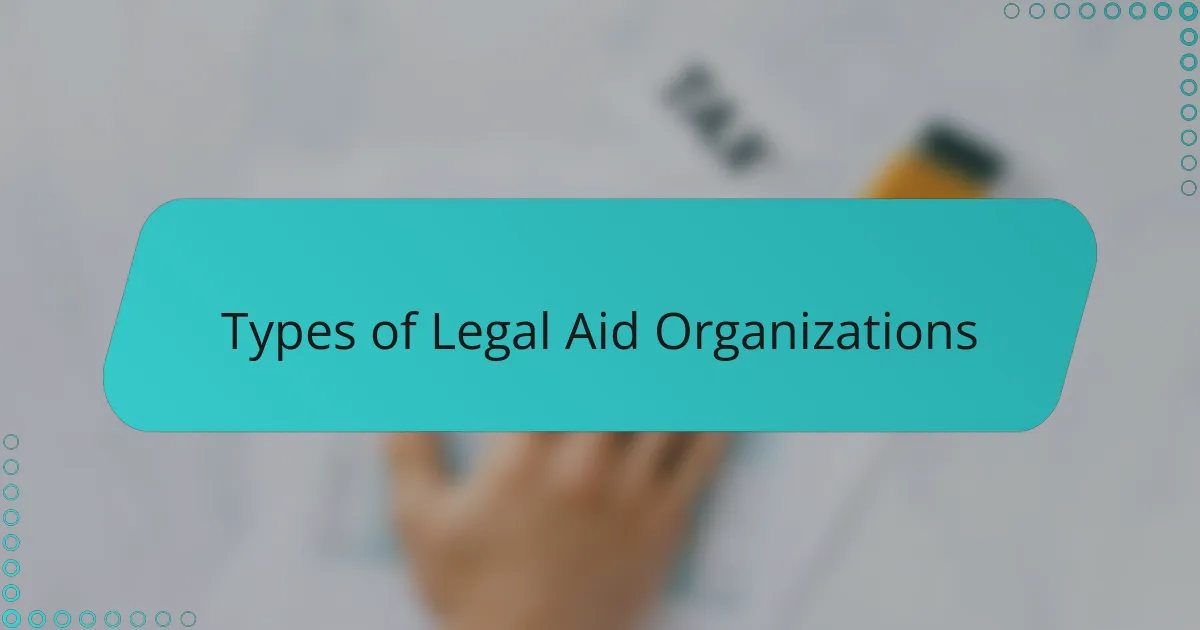
Types of Legal Aid Organizations
Legal aid organizations come in various forms, each serving different needs. Some focus on civil issues like housing or family law, while others specialize in criminal defense or immigration. When I reached out to a small nonprofit dedicated to tenant rights, I realized how specialized knowledge made all the difference in my case.
I remember being surprised by how some organizations are tied to universities, with law students providing assistance under supervision. This approach not only helps clients but also trains new advocates. Have you ever thought about how learning and helping can go hand in hand? For me, it added a layer of trust knowing the students were closely guided by experienced professionals.
There are also government-funded legal aid programs that provide free or low-cost services to those who qualify financially. I found that navigating these options required patience, but the doors they opened were worth it. It made me wonder—how many people miss out simply because they don’t know where to look? Knowing the types of organizations out there is the first step to getting the right help.
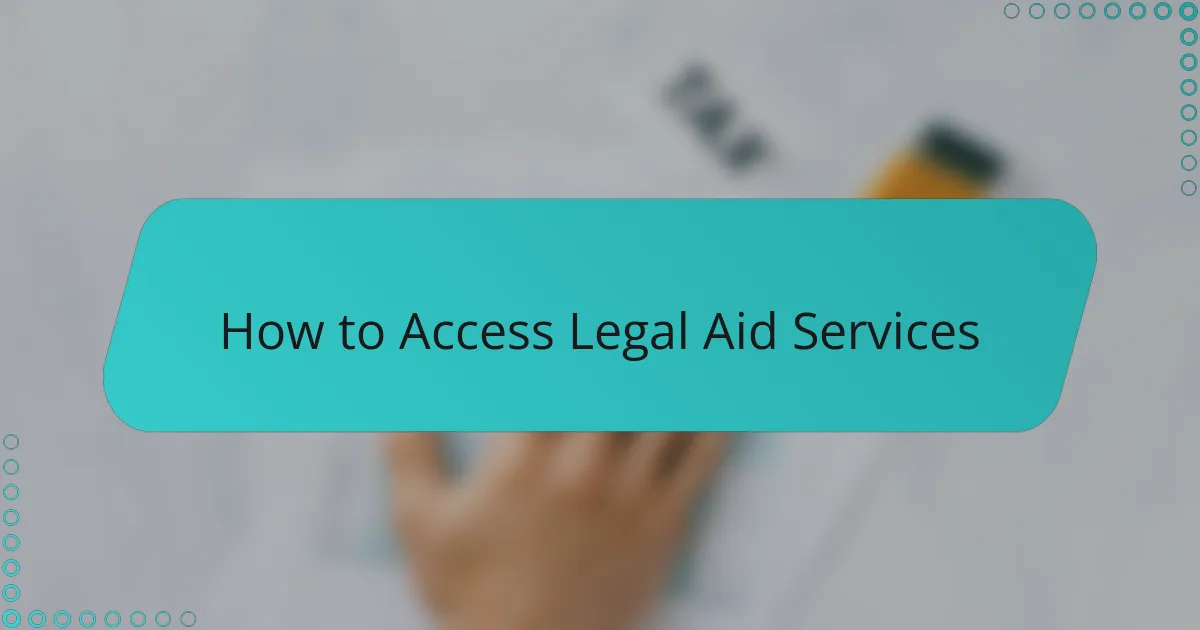
How to Access Legal Aid Services
Accessing legal aid services often starts with knowing where to look, which can feel like searching for a needle in a haystack. When I first needed help, I reached out to local community centers and discovered they often have brochures or contacts for nearby legal aid providers. It made me realize how important it is to ask around—sometimes the best guidance comes from a simple conversation.
Many legal aid organizations have websites with easy-to-follow instructions on eligibility and application processes. I remember feeling relieved when I found an online form that was straightforward and didn’t require legal jargon to understand. Have you ever felt that sudden relief when something complicated suddenly makes sense? That’s what clarity can do when navigating these resources.
Don’t hesitate to call or visit these organizations in person if you can—the staff often provide initial consultations at no cost. I once showed up at a clinic with just my questions, and their willingness to listen put me at ease during a stressful time. This personal touch reminded me that behind every process, there are people ready to help.
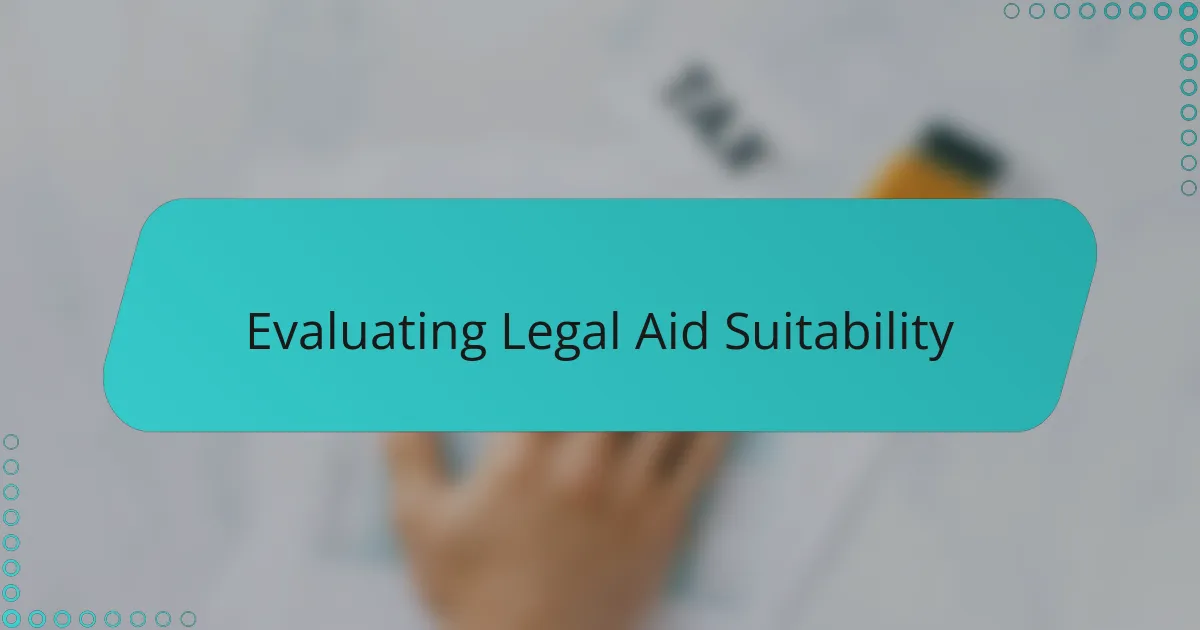
Evaluating Legal Aid Suitability
When deciding whether a legal aid organization is right for me, I first consider if their expertise matches my specific legal issue. It’s frustrating to invest time only to realize they handle cases that don’t quite fit mine. Have you ever felt that mismatch? I learned the hard way that aligning your needs with their specialty saves a lot of hassle.
Another thing I pay attention to is their eligibility criteria. Some organizations require proof of income or particular circumstances, which can feel like jumping through hoops during an already stressful time. But I discovered that understanding these requirements upfront helped me avoid unnecessary applications and focus my energy where it mattered.
Lastly, I think about accessibility—not just physically but also how approachable the staff are. When I first walked into a legal aid office, the welcoming atmosphere and clear explanations turned my anxiety into confidence. Isn’t that the kind of support we all hope for when facing legal challenges? That feeling confirmed to me that suitability isn’t just about rules but the quality of human connection.
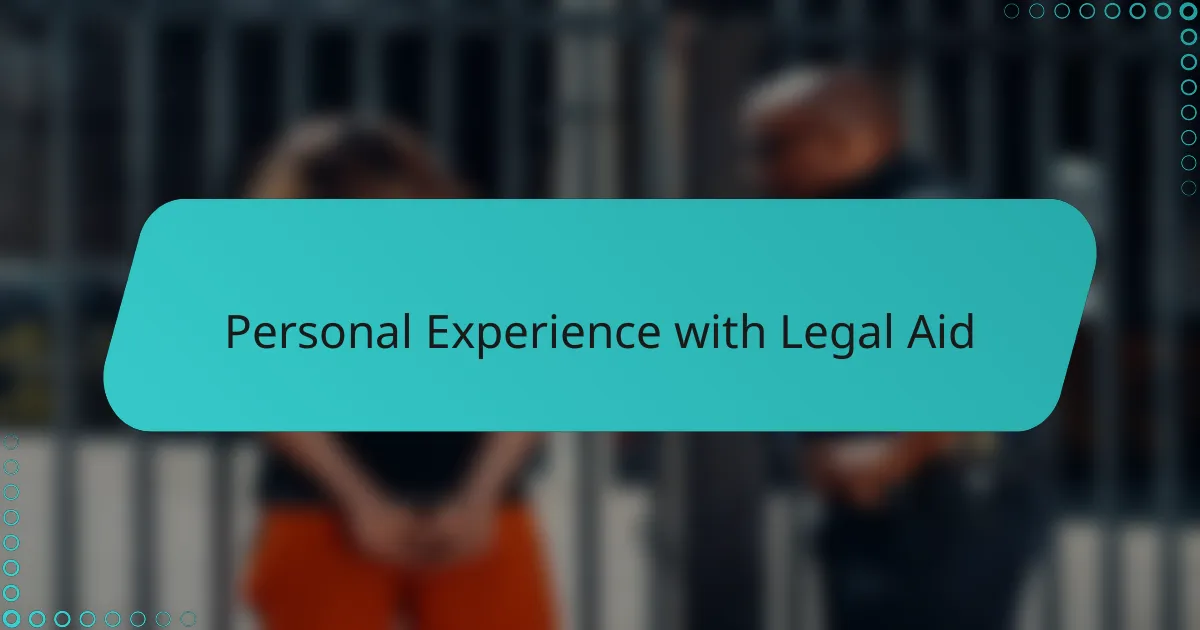
Personal Experience with Legal Aid
The first time I reached out to a legal aid organization, I was honestly nervous—wondering if I would be judged or dismissed. But the person I spoke with listened patiently and explained everything in a way that made me feel understood, not just like another case number. Have you ever experienced that relief when someone truly hears you? It’s a small moment, but it made all the difference in how I approached my situation.
There was also this one instance when a legal aid attorney went out of their way to connect me with additional resources beyond what they could offer directly. That generosity showed me that legal aid isn’t just about legal advice—it’s about community and support. It made me feel less alone during a challenging time.
Looking back, I realize how vital that initial trust was. Without it, I might have given up before getting the help I needed. What I appreciate most is that legal aid organizations reminded me justice isn’t just about laws on paper; it’s about people caring enough to help others navigate those laws.
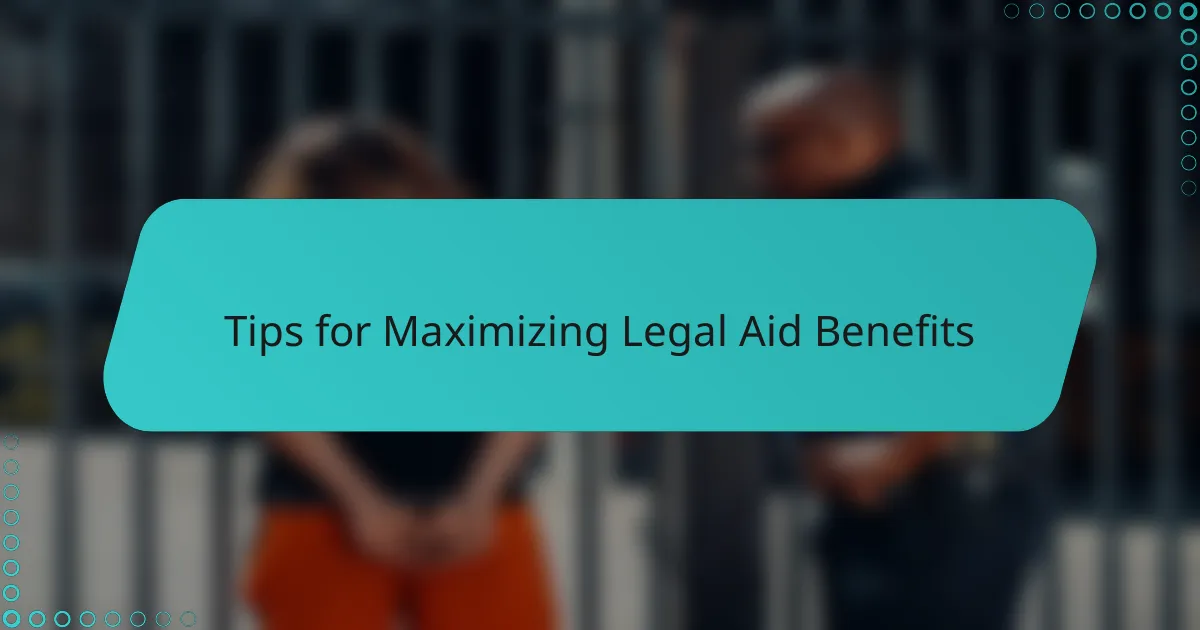
Tips for Maximizing Legal Aid Benefits
One tip I found invaluable was preparing your questions before connecting with legal aid. It sounds simple, but having a clear idea of what you need saves precious time and helps the advocate address your concerns precisely. Have you ever felt your mind go blank in a stressful moment? Jotting down notes beforehand gave me confidence and made each conversation more productive.
Another thing I learned is to be honest about your financial and personal situation. Legal aid organizations have eligibility criteria for a reason, but they can often guide you better if you’re upfront. I was hesitant at first, worried about oversharing, but opening up allowed the staff to suggest programs I didn’t even know existed. Isn’t it surprising how a little transparency can unlock new possibilities?
Lastly, don’t hesitate to follow up regularly. Legal systems can be slow, and waiting passively can be frustrating. When I kept checking in, it showed my commitment and sometimes sped up responses. Have you ever felt stuck waiting for news? Staying proactive not only helps move your case forward but also keeps you connected to the people supporting you.
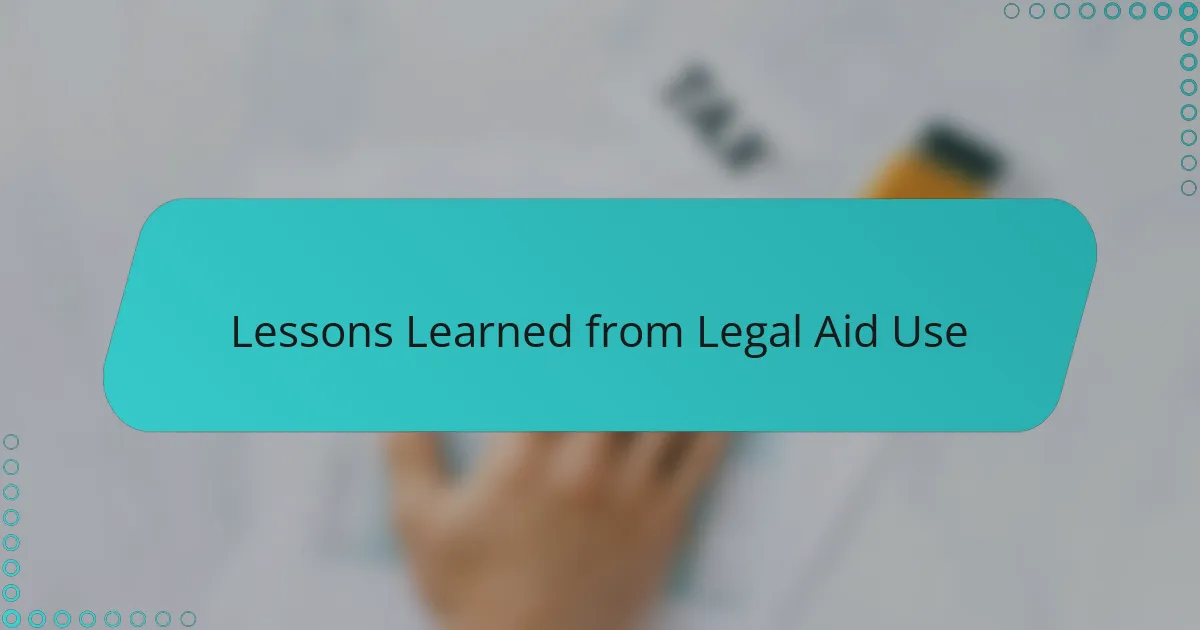
Lessons Learned from Legal Aid Use
What really stood out to me was how patience became a quiet superpower during the whole process. It’s easy to feel discouraged when answers take time or when you hit unexpected obstacles. Have you ever wondered why sticking with it matters so much? In my experience, persistence not only kept my case alive but also built a stronger relationship with those helping me.
I also learned the importance of clear communication. Sometimes I assumed the advocate understood my situation fully without explaining details, only to find out later that key points were missed. Have you experienced that frustrating disconnect? Being honest and thorough made all the difference in getting tailored advice that truly addressed my needs.
Finally, I realized legal aid is as much about empowerment as it is about representation. After each meeting, I felt more informed and confident, which changed how I faced my challenges. Isn’t that how real help should feel—like it lifts you up rather than just fixing things for you? That shift in perspective was one of the most valuable lessons I took from using legal aid services.
